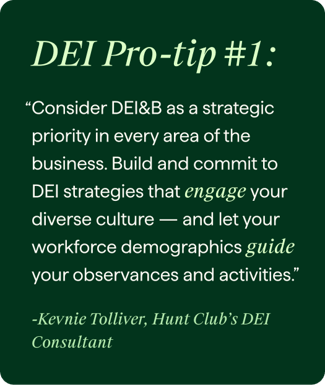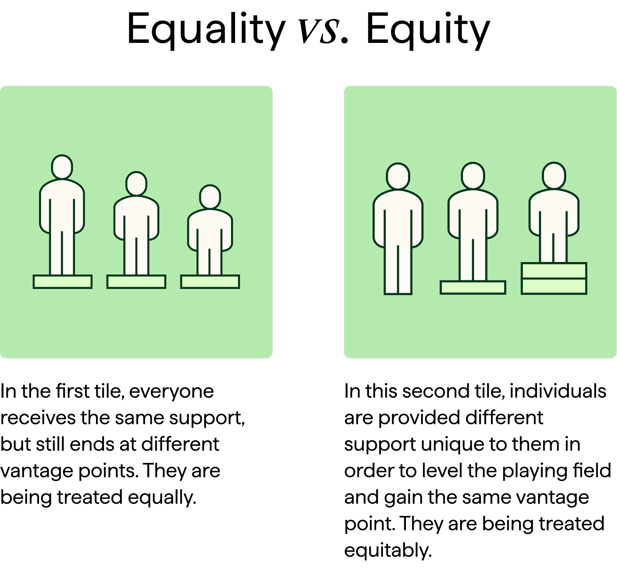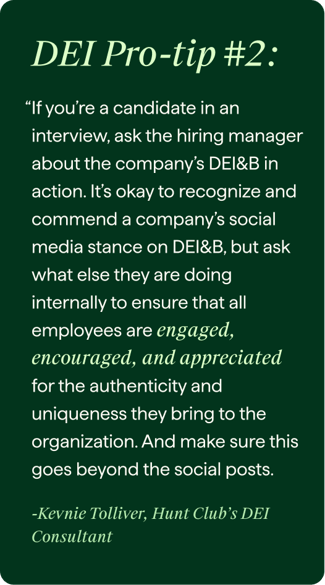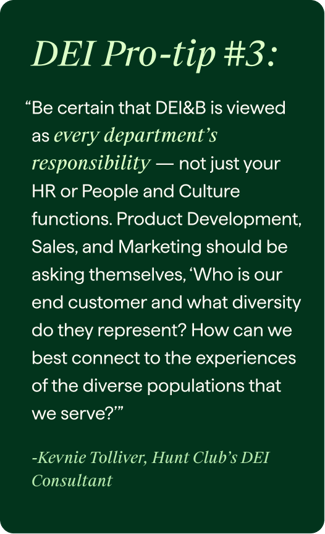Diversity, Equity, and Inclusion (DEI) is a term that has gained lots of attention in recent years as more and more companies strive to create an inclusive work environment.
But it’s more than a corporate buzzword.
DEI is a core business value that’s focused on promoting a diverse workforce and creating an inclusive environment where employees from all backgrounds feel valued and equally supported. This includes promoting equity in terms of pay and opportunities, as well as actively addressing issues related to ethnicity, race, religion, abilities, sexual orientations, and other diverse groups.
In this blog, we'll explore the meaning of DEI and why it’s important for organizations to prioritize these initiatives in order to create a happier, more equitable, and inclusive work environment for all employees.
Do You Know the Difference Between Workplace Diversity and Workplace Equity?
Workplace diversity and workplace equity are terms that are often used interchangeably. While they both create a safe and happy workplace, they’re two very distinct concepts with different policies, goals, and strategies.
Further, workplace equity is another term that’s often conflated with workplace equality (but more on that later!).
Do you know the difference between all of these terms? What about workplace belonging or inclusion? Let’s unpack each of these below.
 What Is Workplace Diversity?
What Is Workplace Diversity?
Diversity refers to all the ways in which we differ from one another.
This might mean differences in the demographic (e.g., race, gender identities, age) or a variety of socioeconomic statuses, sexual orientations, and religious beliefs.
Diversity can also relate to the different ways we view and think of the world around us. This may extend to political perspectives or diversity based on mental or physical abilities.
DEI Pro-tip #1: “Consider DEI&B as a strategic priority in every area of the business. Build and commit to DEI strategies that engage your diverse culture — and let your workforce demographics guide your observances and activities.”
- Kevnie Tolliver, Hunt Club’s DEI Consultant
What Is Workplace Equity?
Related, but ultimately different from equality, workplace equity is the concept (and active practice) of leveling the playing field by providing even and fair opportunities based on an individual’s specific needs.
For something to be equitable, it must be proportionate to the individual.

Workplace equity often involves things related to:
- Promotions and career advancement
- Performance reviews and feedback
- Pay and bonuses
- Access to support resources and tools
- Recruitment and hiring selections
- Terminations and other separations
- Overall fairness in day-to-day experiences in the workplace
While an organization can be diverse, it might not always be equitable.
For example, an organization can comprise a healthy mix of ethnic backgrounds with a strong variety of religious representation. However, it may not be equitable if all these individuals are paid differently based on what makes them diverse. Something like this would actively work against building a healthy DEI culture and can leave glaring inequities and disparities in the workplace.
What Is Workplace Inclusion?
Workplace inclusion is a broad term used to describe a culture in which everyone is invited, included, and ensured an equal opportunity to have their unique skills, talents, and backgrounds at work.
Some examples of an inclusive culture include:
- Encouraging everyone to share feedback and ideas, not just limiting them to C-suite, executive teams, or stakeholders.
- Allowing all team members to contribute to decision-making.
- Celebrating or observing multicultural holidays.
- Providing equal access to equipment, promotions, time off, etc.
Bonus: What Is Workplace Belonging?
Workplace belonging is an accumulation of experiences, programs, policies, and more that make a person feel safe to bring their unique and authentic selves to work.
When an employee feels a sense of belonging, they feel comfortable being exactly who they are at work. They don’t fear losing their job because of their sexual orientation or being passed up for a promotion because of a physical disability. They’re treated fairly and feel that their unique selves are not only accepted, but welcomed and appreciated.
Why Is DEI in an Organization Important? Do I Really Need To Focus On It?
The short answer? Yes.
Not only do authentic DEI initiatives build an inclusive workplace culture where employees feel happy and valued, they impact nearly every other aspect of your business including talent acquisition.
Here are some other benefits of focusing on building healthy and authentic DEI practices.
1. Employees Are There For the Long Haul
Improved employee retention is just the starting point. When your employees feel that they are valued equally amongst different groups, receive fair treatment across the board, and are respected for who they are, they’re more inclined to stick around long-term.
This is because authentic DEI programs and values positively impact employee engagement and their overall well-being.
 2. Attract More Candidates and Win Top Talent From Diverse Backgrounds
2. Attract More Candidates and Win Top Talent From Diverse Backgrounds
Great talent comes from all kinds of different backgrounds and they’re more likely to join your talent pool and company if it’s clear they’ll be respected and celebrated for who they are.
When your organization focuses on maintaining DEI as a core value, prospective employees see that — better yet, they want to join that.
In addition to healthcare and paid time off, a company’s commitment to diversity and inclusion is among the top things candidates look for in a potential employer. They want to be a part of organizations committed to building up underrepresented groups and providing mentoring and DEI training for all.
In fact, it’s reported that a staggering 70% of job seekers value an organization’s approach and commitment to DEI when evaluating employers and their future roles.
DEI Pro-Tip #2: "If you’re a candidate in an interview, ask the hiring manager about the company’s DEI&B in action. It’s okay to recognize and commend a company’s social media stance on DEI&B, but ask what else they are doing internally to ensure that all employees are engaged, encouraged, and appreciated for the authenticity and uniqueness they bring to the organization. And make sure this goes beyond the social posts."
- Kevnie Tolliver
3. Positive Impact on Profitability
DEI can even influence your bottom line.
In one McKinsey study, DEI is reported to have positive impacts on business profitability and financial performance. Its study found that companies in the top quartile for gender diversity in executive teams were up to 25% more likely to have above-average profitability than companies in the bottom quartile.
In another study by Gartner, 75% of organizations with executive teams that reflect diverse and inclusive cultures exceed their financial targets.
4. Invites Diverse Thoughts and Innovation
What happens when you invite a diverse group of people into your organization? You also invite their unique thoughts and experiences to inform your business strategies, drive innovation, and impact the overall organization’s performance.
Diversity of thought can lead to new product development, generate new marketing initiatives, and can even help resolve financial challenges.
5. Helps Employees Feel a Sense of Belonging
Being able to provide a welcoming and safe space for people to do their very best work is a benefit you can’t put a price on.
If all for naught, implementing authentic DEI strategies simply helps your employees feel a strong sense of belonging. This sense of belonging is key to boosting employee morale, which can ultimately lead to higher productivity and achievement.
 6. Gain a Competitive Business Advantage
6. Gain a Competitive Business Advantage
Forward-thinking companies understand and embrace the fast-growing and diverse world they're a part of — and having a diverse executive team and workforce can help your company better meet the needs of the diverse customers around them.
DEI Pro-Tip #3: “Be certain that DEI&B is viewed as every department’s responsibility — not just your HR or People and Culture functions. Product Development, Sales, and Marketing should be asking themselves, ‘Who is our end customer and what diversity do they represent? How can we best connect to the experiences of the diverse populations that we serve?’”
- Kevnie Tolliver
What’s more, many customers in today’s global marketplace actively seek organizations that reflect their values and perspectives. In fact, it’s reported that up to 82% of customers look for consumer brands whose values align with their own.
Hunt Club Can Help You Hire With Diversity in Mind
What does DEI look like in your office?
Are you able to better serve your customers and employees by building authentic DEI practices? Do you need more insight into DEI or hands-on support in building a diverse team?
Hunt Club partners with top organizations to build more inclusive working communities and is committed to creating a more diverse workforce.
Reach out to us today to learn more about how we can help you hire with diversity in mind.







